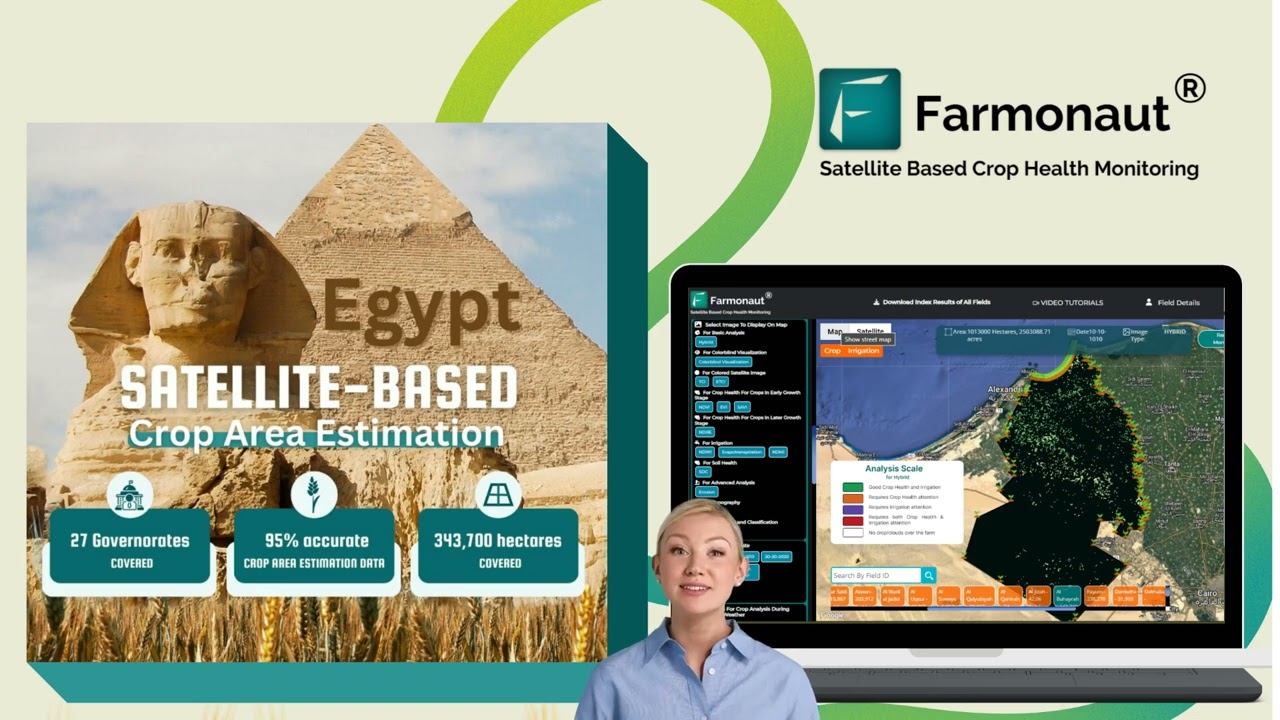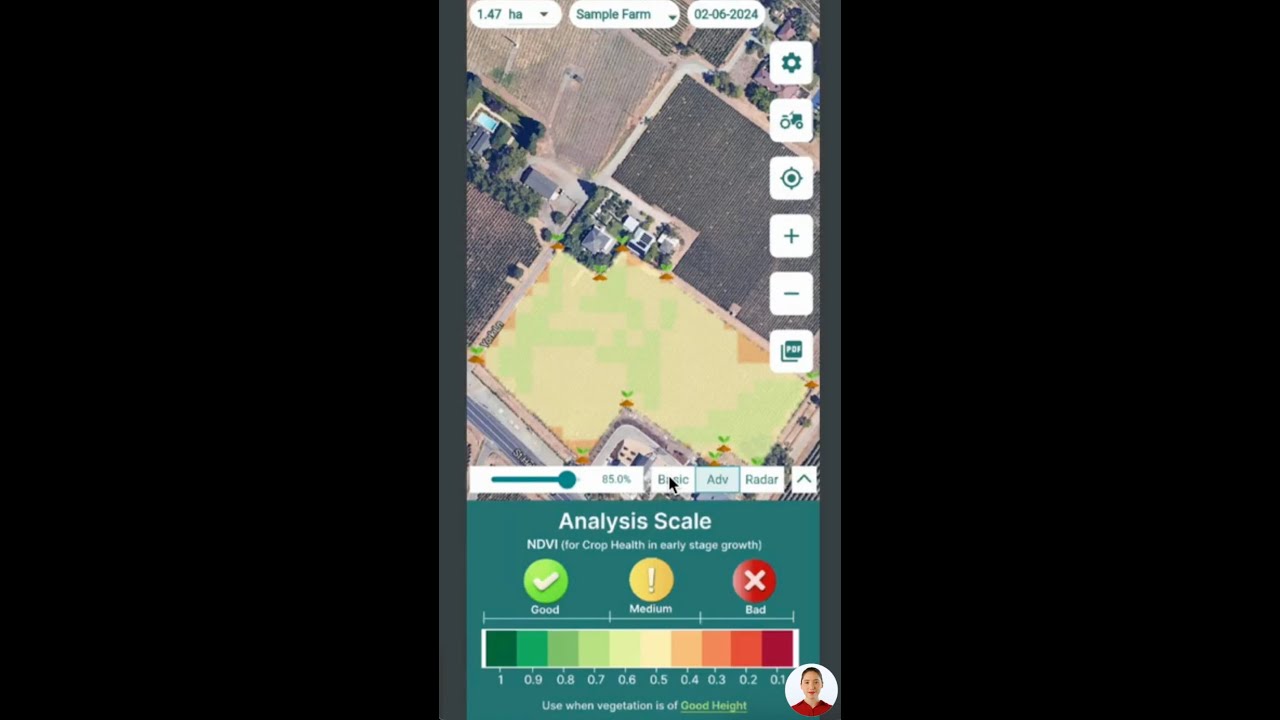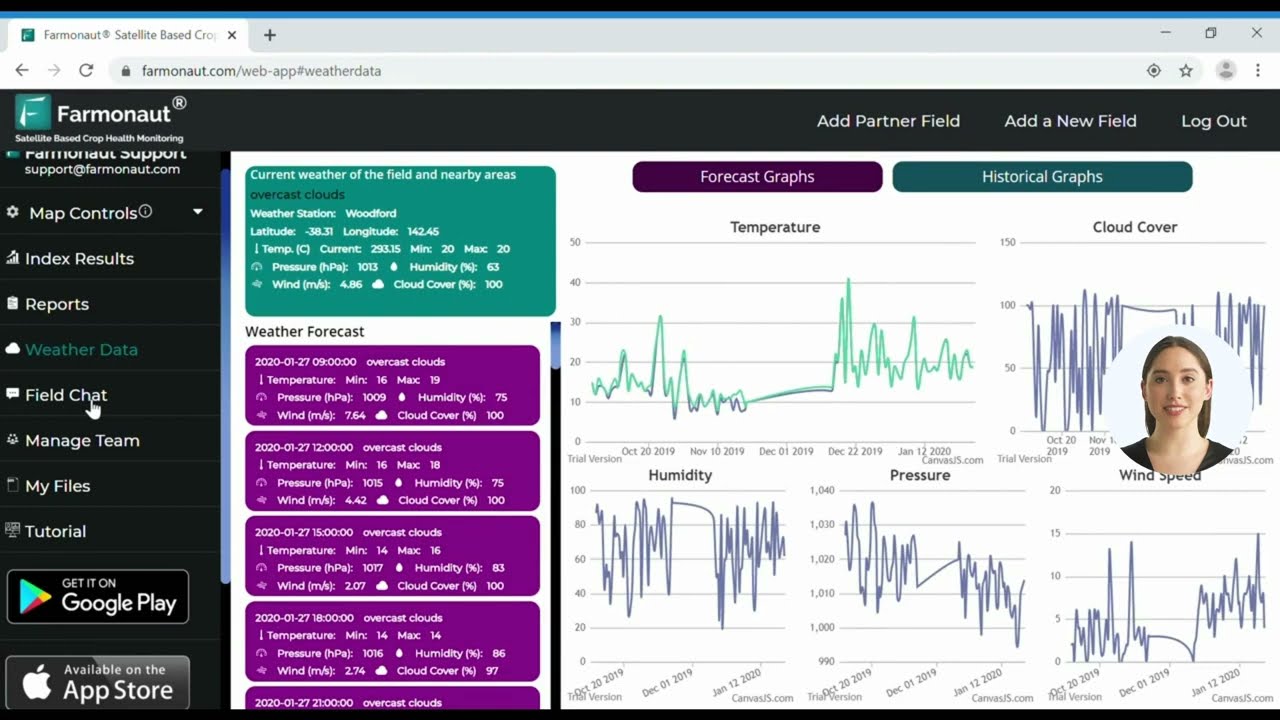Mastering Livestock Management: Expert Guide to Supplementing Sheep on Dry Pastures and Stubbles in SA

“Proper supplementation can increase sheep’s rumen microbe population by up to 400%, enhancing nutrient absorption from dry pastures.”
Welcome to our comprehensive guide on mastering livestock management, focusing on supplementing sheep on dry pastures and stubbles in South Australia (SA). As we navigate the challenges of summer and autumn grazing, it’s crucial to understand the intricacies of livestock management on dry pastures and implement effective strategies for stubble grazing nutrition. At Farmonaut, we’re committed to providing farmers with cutting-edge agtech solutions to optimize their farming practices and ensure the well-being of their flocks.
In this expert guide, we’ll explore the complexities of supplementing sheep diets, maintaining rumen microbe health, and utilizing precision agriculture technology to enhance your livestock management techniques. Whether you’re a seasoned farmer or new to the industry, this blog post will equip you with the knowledge and tools necessary to navigate the challenges of dry season farming and ensure your flock’s optimal health and productivity.
Understanding the Challenges of Dry Pastures and Stubbles
Before diving into supplementation strategies, it’s essential to comprehend the unique challenges posed by dry pastures and stubbles in SA. During summer and autumn, these grazing areas often become nutrient-deficient, presenting significant obstacles for sheep farmers:
- Reduced pasture quality and quantity
- Lower digestibility of available plant material
- Decreased protein and energy content in feed
- Limited access to green, nutrient-rich forage
- Increased risk of nutrient deficiencies in livestock
These challenges necessitate a proactive approach to livestock management, with a focus on supplementing sheep diets to maintain their health and productivity. Let’s explore the key components of effective supplementation and pasture management strategies.
The Importance of Rumen Microbe Health
At the heart of successful sheep nutrition lies the health of the rumen microbes. These microscopic organisms play a crucial role in breaking down fibrous plant material and converting it into nutrients that sheep can utilize. When grazing on dry pastures and stubbles, maintaining a healthy rumen microbe population becomes even more critical.
Key factors affecting rumen microbe health:
- Availability of nitrogen and other essential nutrients
- Adequate energy sources for microbial growth
- Proper pH balance within the rumen
- Consistent feed intake and grazing patterns
By focusing on these factors, we can develop supplementation strategies that not only meet the sheep’s nutritional needs but also support the vital rumen microbes that drive their digestive efficiency.
Pasture Quality Assessment: The Foundation of Effective Supplementation
Before implementing any supplementation program, it’s crucial to assess the quality of your pastures and stubbles. This evaluation forms the basis for determining the type and quantity of supplements required. At Farmonaut, we offer advanced satellite-based crop monitoring tools that can assist in this assessment process.
Our precision agriculture technology provides farmers with:
- Real-time vegetation health indices (NDVI)
- Soil moisture level monitoring
- Historical pasture performance data
- Customized pasture quality reports
By leveraging these agtech solutions, farmers can make data-driven decisions about their supplementation strategies, ensuring optimal resource allocation and feed efficiency.
Essential Nutrients for Sheep on Dry Pastures
When grazing on dry pastures and stubbles, sheep often lack access to critical nutrients necessary for their health and productivity. Understanding these key nutrients and their roles is essential for developing an effective supplementation strategy:
- Protein: Crucial for muscle development, milk production, and overall growth
- Energy: Vital for maintaining body condition and supporting all bodily functions
- Nitrogen: Essential for rumen microbe function and protein synthesis
- Calcium: Important for bone health, milk production, and muscle function
- Phosphorus: Necessary for energy metabolism and bone formation
- Vitamins and trace minerals: Support various physiological processes and immune function
Let’s explore each of these nutrients in detail and discuss effective supplementation strategies to ensure your sheep receive adequate nutrition during challenging dry periods.
Protein Supplementation
Protein is a critical nutrient for sheep, particularly for pregnant ewes, lactating mothers, and growing lambs. During dry periods, natural protein sources in pastures can be scarce, making supplementation essential.
Effective protein supplements include:
- Lupins
- Soybean meal
- Canola meal
- Cottonseed meal
- Urea (non-protein nitrogen source)
When selecting a protein supplement, consider factors such as cost-effectiveness, availability, and the specific needs of your flock. For example, pregnant ewes in their last trimester may require higher protein levels to support fetal development and prepare for lactation.
Energy Supplementation
Ensuring adequate energy intake is crucial for maintaining body condition and supporting various physiological processes in sheep. Dry pastures and stubbles often lack the necessary energy content, making supplementation vital.
Energy-rich feed options include:
- Cereal grains (barley, oats, wheat)
- Molasses
- High-quality hay
- Pelletized feed concentrates
When providing energy supplements, it’s essential to introduce them gradually to avoid digestive upset. Additionally, consider the balance between protein and energy in the overall diet to optimize nutrient utilization.
Nitrogen and Urea Supplementation
Nitrogen plays a crucial role in supporting rumen microbe function and protein synthesis. In dry pastures, nitrogen content can be low, limiting the efficiency of feed utilization. Urea supplementation can be an effective way to provide non-protein nitrogen to the rumen microbes.
Key considerations for urea supplementation:
- Introduce urea gradually to allow rumen microbes to adapt
- Ensure adequate energy sources are available alongside urea
- Monitor intake carefully to prevent urea toxicity
- Consider using urea-molasses blocks for controlled intake
While urea can be an effective and economical nitrogen source, it’s crucial to use it judiciously and in conjunction with other nutritional strategies.
Calcium and Mineral Supplementation
Calcium and other minerals are essential for various physiological functions in sheep, including bone health, muscle function, and milk production. Dry pastures may not provide adequate mineral content, necessitating supplementation.
“Gestating ewes require 50% more calcium in their diet during the last 6 weeks of pregnancy for optimal lamb development.”
Effective mineral supplementation strategies include:
- Providing mineral licks or blocks
- Incorporating mineral premixes into feed rations
- Offering calcium-rich supplements like limestone flour
- Ensuring access to salt (sodium chloride) for electrolyte balance
Regular monitoring of your flock’s health and performance can help identify any mineral deficiencies that may require additional supplementation.
Sustainable Grazing Practices for Dry Pastures
While supplementation is crucial, implementing sustainable grazing practices is equally important for managing sheep on dry pastures and stubbles. These practices help maintain pasture health, optimize feed utilization, and ensure long-term sustainability of your grazing lands.
Key sustainable grazing strategies include:
- Rotational grazing to prevent overgrazing and allow pasture recovery
- Maintaining adequate ground cover to prevent soil erosion
- Implementing containment feeding areas during extreme dry periods
- Monitoring and managing stocking rates based on pasture availability
- Utilizing drought-tolerant pasture species in prone areas
By combining these sustainable grazing practices with effective supplementation strategies, farmers can optimize their livestock management on dry pastures and stubbles.
Precision Agriculture Technology in Livestock Management
At Farmonaut, we believe in the power of precision agriculture technology to revolutionize livestock management. Our advanced satellite-based solutions offer farmers innovative tools for benchmarking pasture quality and optimizing feed efficiency.
Key benefits of our precision agriculture technology include:
- Real-time monitoring of pasture health and productivity
- Data-driven decision-making for supplementation strategies
- Early detection of pasture degradation or nutrient deficiencies
- Improved resource allocation and cost-effectiveness
- Enhanced ability to adapt to changing environmental conditions
By integrating these agtech solutions into your livestock management practices, you can gain valuable insights that inform your supplementation and grazing strategies, ultimately leading to improved flock health and productivity.
Explore our precision agriculture solutions:
Practical Tips for Implementing Supplementation Strategies
Now that we’ve covered the essential nutrients and technologies involved in supplementing sheep on dry pastures, let’s discuss some practical tips for implementing these strategies effectively:
- Gradual introduction: Always introduce new supplements gradually to allow the sheep’s digestive system to adapt.
- Consistent feeding times: Establish and maintain regular feeding schedules to promote stable rumen function.
- Monitor body condition: Regularly assess the body condition of your flock to ensure supplementation is meeting their needs.
- Provide adequate water: Ensure clean, fresh water is always available, as water intake is crucial for feed utilization.
- Consider different classes of stock: Tailor supplementation strategies to meet the specific needs of pregnant ewes, lactating mothers, growing lambs, and mature sheep.
- Use feed testing: Regularly test the nutritional content of your pastures and supplements to fine-tune your feeding program.
- Implement strategic supplementation: Focus on critical periods such as late pregnancy and early lactation for targeted nutrient support.
By following these practical tips and leveraging the insights provided by Farmonaut’s precision agriculture technology, you can develop a comprehensive and effective supplementation strategy for your flock.
Managing Health Risks in Dry Conditions
While focusing on nutrition is crucial, it’s equally important to manage potential health risks associated with grazing on dry pastures and stubbles. Some key areas to consider include:
- Parasite management: Monitor and control internal parasites (worms) and external parasites (flies, lice) which can thrive in certain dry conditions.
- Vaccination programs: Maintain regular vaccination schedules to protect against common diseases.
- Poisoning prevention: Be aware of potentially toxic plants that may become more appealing to sheep in dry conditions.
- Foot health: Regular hoof checks and maintenance to prevent lameness issues.
- Pest control: Implement strategies to manage pests such as rabbits, foxes, and wild dogs that may pose threats to your flock.
By addressing these health concerns alongside your nutritional strategies, you can ensure comprehensive care for your sheep during challenging dry periods.
Planning for Recovery and Future Resilience
As we focus on managing sheep through dry periods, it’s also essential to plan for pasture recovery and build resilience for future challenges. Consider the following strategies:
- Pasture rest and recovery: Implement rotational grazing systems that allow pastures adequate time to recover.
- Soil health management: Focus on maintaining and improving soil health to support pasture regrowth.
- Diversification of feed sources: Explore options for alternative fodder crops or pasture species that are more drought-tolerant.
- Water infrastructure: Invest in efficient water management systems, including improved dams and catchments.
- Flexible stocking strategies: Develop plans for adjusting stock numbers in response to changing pasture conditions.
By incorporating these forward-thinking strategies, you can enhance your farm’s resilience and better prepare for future dry seasons.
Leveraging Technology for Informed Decision-Making
In today’s digital age, leveraging technology is crucial for making informed decisions about livestock management. Farmonaut’s suite of precision agriculture tools can provide valuable insights to support your supplementation and grazing strategies:
- Satellite-based vegetation monitoring: Track pasture health and productivity in real-time.
- AI-powered advisory systems: Receive personalized recommendations based on your specific farm conditions.
- Weather forecasting integration: Plan supplementation and grazing strategies with accurate weather predictions.
- Data analytics: Analyze historical farm data to identify trends and optimize management practices.
By integrating these technological solutions into your farm management practices, you can make data-driven decisions that improve the efficiency and effectiveness of your livestock management strategies.
Explore our API solutions for developers:
Nutritional Supplement Guide for Sheep on Dry Pastures
| Nutrient | Importance | Supplement Options | Recommended Intake (g/day/sheep) |
|---|---|---|---|
| Protein | Essential for growth, milk production, and overall health | Lupins, soybean meal, canola meal, urea | 50-100 |
| Energy | Maintains body condition and supports bodily functions | Cereal grains, molasses, high-quality hay | 200-400 |
| Calcium | Critical for bone health and milk production | Limestone flour, mineral blocks | 2-4 |
| Nitrogen | Supports rumen microbe function | Urea, protein meals | 5-10 (as urea) |
| Phosphorus | Important for energy metabolism and bone formation | Dicalcium phosphate, mineral supplements | 1-3 |
Note: These recommendations are general guidelines. Always consult with a veterinarian or animal nutritionist for advice tailored to your specific flock and conditions.
Conclusion: Mastering Livestock Management for Sustainable Farming
Mastering livestock management on dry pastures and stubbles in SA requires a comprehensive approach that combines nutritional supplementation, sustainable grazing practices, and the use of precision agriculture technology. By understanding the unique challenges posed by dry conditions and implementing targeted strategies to address them, farmers can ensure the health and productivity of their flocks even in challenging times.
At Farmonaut, we’re committed to supporting farmers with innovative agtech solutions that provide valuable insights for informed decision-making. By leveraging our satellite-based monitoring tools and data analytics capabilities, you can optimize your supplementation strategies, improve pasture management, and build a more resilient farming operation.
Remember, successful livestock management is an ongoing process that requires adaptability and a willingness to embrace new technologies and practices. By staying informed, utilizing available resources, and prioritizing the health of your flock and pastures, you can navigate the challenges of dry season farming and ensure long-term sustainability for your sheep enterprise.
Frequently Asked Questions (FAQ)
- Q: How often should I supplement my sheep on dry pastures?
A: The frequency of supplementation depends on pasture conditions and the nutritional needs of your flock. Generally, daily supplementation is recommended during severe dry periods, while less frequent (e.g., 2-3 times per week) supplementation may be sufficient in moderate conditions. Regular monitoring of your sheep’s body condition and pasture quality will help determine the optimal supplementation schedule. - Q: Can I use urea as the sole protein supplement for my sheep?
A: While urea can be an effective and economical source of non-protein nitrogen, it should not be used as the sole protein supplement. It’s best to combine urea with other protein sources like lupins or soybean meal to ensure a balanced amino acid profile. Always introduce urea gradually and ensure adequate energy sources are available to support efficient urea utilization by rumen microbes. - Q: How can I determine if my sheep are receiving adequate nutrition on dry pastures?
A: Regular body condition scoring is an effective way to assess your sheep’s nutritional status. Additionally, monitoring factors such as wool growth, lamb growth rates, and overall flock health can provide insights into nutritional adequacy. Farmonaut’s precision agriculture tools can also help by providing data on pasture quality and productivity, allowing you to make informed decisions about supplementation needs. - Q: What are the risks of overfeeding supplements to sheep on dry pastures?
A: Overfeeding supplements can lead to several issues, including:- Digestive upset and acidosis, particularly with grain-based supplements
- Reduced grazing behavior, potentially leading to underutilization of available pasture
- Increased feed costs without proportional benefits
- Potential for toxicity, especially with certain minerals or urea
It’s crucial to carefully manage supplement quantities and introduce new feeds gradually to minimize these risks.
- Q: How can Farmonaut’s technology help me manage my sheep on dry pastures?
A: Farmonaut’s precision agriculture technology offers several benefits for managing sheep on dry pastures:- Real-time monitoring of pasture health and productivity through satellite imagery
- AI-driven insights for optimizing grazing and supplementation strategies
- Historical data analysis to identify trends and improve decision-making
- Integration of weather forecasts to help plan for changing conditions
- Customized reports and alerts to support proactive management
These tools can help you make data-driven decisions about when and how to supplement your flock, ultimately improving efficiency and productivity.
We hope this comprehensive guide has provided you with valuable insights into mastering livestock management on dry pastures and stubbles in SA. By implementing these strategies and leveraging Farmonaut’s innovative agtech solutions, you can ensure the health and productivity of your flock even in challenging conditions.
For more information on how Farmonaut can support your farming operations, explore our subscription options below:





















